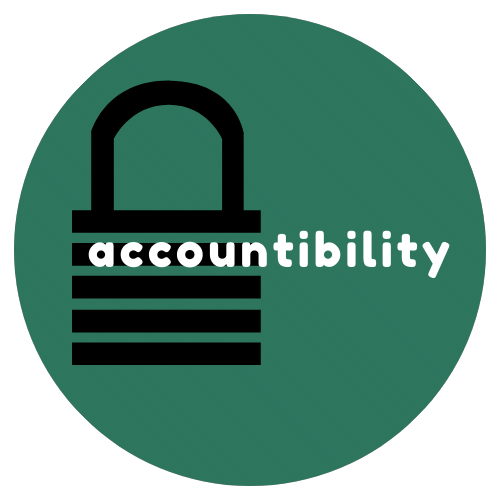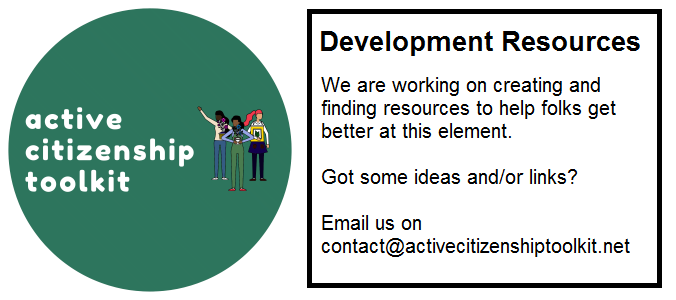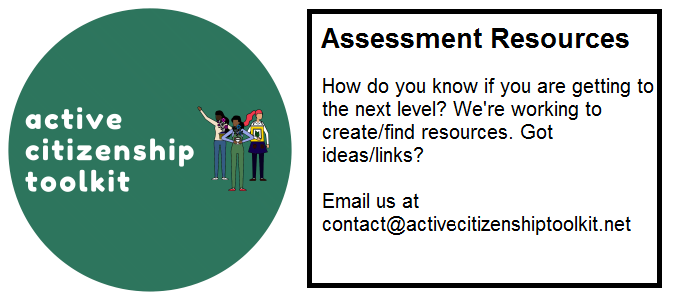Element Descriptor

Social movement organisations tend to be made up of volunteers, squeezing their work in around many other commitments. Everyone fails to do things they said they would sometimes, but if persistent or important failures are not recognised and action taken to reduce likelihood of repeats, morale, recruitment and retention will all disappear like a fist when you open your palm.
Level descriptors
| Novice | Practitioner | Expert | Ninja |
|---|---|---|---|
| Able to explain the importance of accountability – completing tasks you said you would or saying you won’t – and maintain good practice in a small group of highly motivated and relatively well organised people who know each other well | Able to cope with lunching out (failing to complete agreed actions) when it is being used as a proxy between competing individuals/factions, some of whom think time is a bourgeois concept anyway, and who do you think died and made you chief fascist? | Able to maintain accountability and task discipline with large groups of people with competing understandings of the importance of keeping commitments and the consequence for failure, in situations where some are actively trying to scupper the group | Able to surface the underlying causes and consequences of lunching out with groups who have become wedded to ‘yeah whatever’ and are currently blind to its implications for recruitment and retention. Able to instil good practice without creating resentment or rancour, and to maintain it over time. |
Element Overview Essay
The problem for small non hierarchical groups, social movement organisations that are trying to “do accountability” is that people very often came to the group to get away from the appraisals and personal development plans and spreadsheets, which are a normal part of, well, bureaucracy or capitalism, instrumental reason, as Weber called it. So if you’re going to do accountability, you have to be able to sell it, as it were, to the people coming in. And you have to do it in ways that don’t give them flashbacks and emotional resistance to what you’re proposing.
The other barrier is that most people assume that accountability has to be from the centre out very top down, almost like Hobbes’ Leviathan with the beady eye, spotting bad people and punishing them. There’s no real model or public understanding that accountability can be a collective endeavour, where the people in the group keep tabs on each other, but in supportive and compassionate ways. You just don’t see that in movies or read about it in books. And mostly you don’t see it in your real life. So you assume that accountability is giving someone a stick to beat you with and there’s enough anxiety and horror in the world without doing that.
However, if you don’t have accountability mechanisms, inevitably, what happens is that people who have volunteered to do the job or been assigned to do a job, you’ve had a job delegated to them (and we can talk about the difference between delegating jobs and delegating problems later), is that sooner or later, people either don’t do the job at all, or they do it at the last minute in a very rushed way. Or they do it below the standard that they wanted that other people wanted that everyone kind of agreed.
Now, normally, that kind of gets ignored because people don’t want to have a conflict with the relatively small number of people in their group. And they have that the person will realise what they’ve done and that it won’t happen again. That might be the case, it might be a one-off. But the person who did it might instead say, “well, the rest of the group didn’t mind it was a bit half assed. So I’ll reduce my, my level of effort.” So the wrong signal may be sent or received. Alternatively, other people will look at it and go, “Oh, this group’s not serious. I’m out of here.” So morale can be badly affected, when performance is below the level that was agreed. And there are no attempts to talk about it.
The next problem is though, that most of the time when we try and do accountability, we do it badly. We publicly and when I say we, I’m Talking about my younger self, Probably my present self. And please god no, not my future self. But yeah, that this will happen. We do public shaming and scolding, we do sarcasm, we do snark. We don’t explore what the reasons for the lack of a great performance were. Maybe there are genuine reasons rather than excuses as to why the task wasn’t completed. So what you’re left with is that most people just don’t grasp the nettle. And what that means is problems usually get worse rather than better.
And groups can collapse because of the lack of accountability mechanisms and I’ve seen it many times So we’ve talked about the causes, some of the causes, and some of the consequences.
What we can do about it? Well, as I alluded to earlier, you need to make sure when people are volunteering to do jobs, or jobs being delegated, are they taking on a task? Or are they taking on a problem? So say, someone volunteers to do the task of phoning the Friends Meeting House to find out if they’ve got a room for a meeting, three, Monday’s away. That’s a task. And the person can do that and find out No, there isn’t a room. And then that’s it.
Other people may have been thinking, “Oh, John is going to find a venue for us.” And when they come to the next meeting, and find out that John didn’t then find other venues and didn’t put a call out the people to think of other places. They’re angry. But John actually did what the task was. So you have to get your delegation and division of labour responsibilities quite specific. And that sounds pernickety in the midst of a meeting. But over time, it gets easier. And if you don’t do it, things will blow up.
The next problem is, of course, people taking on tasks that are too big, because they want to prove to themselves or others, that they’re a committed member of the group. Or they don’t really have an understanding of what their current skill levels are. We all fall prey to things like the planning fallacy where we believe that because we’re especially focused and especially brilliant, it’ll take us half the time that it would someone else because we won’t get distracted, we won’t get tired, we won’t get confused, we won’t make missteps, etc.
“Would that it were so simple” but it’s not. So what we need all of us is to be better at breaking tasks down and giving a more plausible estimate of what’s going to be involved.
At the end of the day, though, you do all those things, you’re still going to have cases where people just don’t complete the tasks that they were supposed to. So in the first instance, I would argue that their buddy – and every group should be broken down into buddies – Their buddies should raise it with them in crivit informally, and in a gentle but firm, compassionate manner, and find out what the person who didn’t do the task thinks of the reasons that they didn’t do the task. Now, obviously, this can spiral and it can become a, “You’re not the boss of me” and “I’m busy” and all the rest of it. And if a person’s actually like that consistently, then maybe they don’t belong in the group. Frankly, everyone can have bad days, everyone can have bad weeks. Of course we can. But if someone is persistently making excuses instead of making action, you have to think about the damage that they’re doing to your group’s credibility, to its morale and its ability to recruit and retain other people who want to get stuff done.
Development Resources

Assessment Resources

